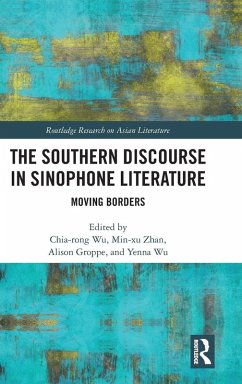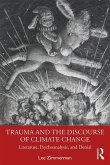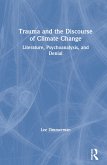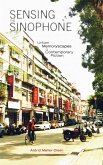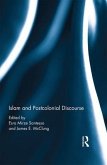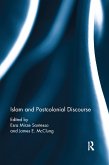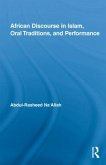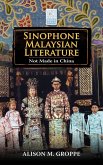The Southern Discourse in Sinophone Literature
Moving Borders
Herausgeber: Chia-Rong Wu, Chia-Rong; Groppe, Alison; Zhan, Min-Xu
The Southern Discourse in Sinophone Literature
Moving Borders
Herausgeber: Chia-Rong Wu, Chia-Rong; Groppe, Alison; Zhan, Min-Xu
- Gebundenes Buch
- Merkliste
- Auf die Merkliste
- Bewerten Bewerten
- Teilen
- Produkt teilen
- Produkterinnerung
- Produkterinnerung
This book delves into the evolving Southern discourse in Sinophone literature and explores its significance in the global context.
Andere Kunden interessierten sich auch für
![Trauma and the Discourse of Climate Change Trauma and the Discourse of Climate Change]() Lee ZimmermanTrauma and the Discourse of Climate Change46,99 €
Lee ZimmermanTrauma and the Discourse of Climate Change46,99 €![Trauma and the Discourse of Climate Change Trauma and the Discourse of Climate Change]() Lee ZimmermanTrauma and the Discourse of Climate Change160,99 €
Lee ZimmermanTrauma and the Discourse of Climate Change160,99 €![Sensing the Sinophone Sensing the Sinophone]() Astrid Møller-OlsenSensing the Sinophone94,99 €
Astrid Møller-OlsenSensing the Sinophone94,99 €![Islam and Postcolonial Discourse Islam and Postcolonial Discourse]() Esra Mirze SantessoIslam and Postcolonial Discourse178,99 €
Esra Mirze SantessoIslam and Postcolonial Discourse178,99 €![Islam and Postcolonial Discourse Islam and Postcolonial Discourse]() Esra Mirze SantessoIslam and Postcolonial Discourse56,99 €
Esra Mirze SantessoIslam and Postcolonial Discourse56,99 €![African Discourse in Islam, Oral Traditions, and Performance African Discourse in Islam, Oral Traditions, and Performance]() Abdul-Rasheed Na'AllahAfrican Discourse in Islam, Oral Traditions, and Performance118,99 €
Abdul-Rasheed Na'AllahAfrican Discourse in Islam, Oral Traditions, and Performance118,99 €![Sinophone Malaysian Literature Sinophone Malaysian Literature]() Alison M. GroppeSinophone Malaysian Literature94,99 €
Alison M. GroppeSinophone Malaysian Literature94,99 €-
-
-
This book delves into the evolving Southern discourse in Sinophone literature and explores its significance in the global context.
Produktdetails
- Produktdetails
- Verlag: Routledge
- Seitenzahl: 250
- Erscheinungstermin: 8. September 2025
- Englisch
- Abmessung: 240mm x 161mm x 18mm
- Gewicht: 543g
- ISBN-13: 9781032968186
- ISBN-10: 1032968184
- Artikelnr.: 73960795
- Herstellerkennzeichnung
- Libri GmbH
- Europaallee 1
- 36244 Bad Hersfeld
- gpsr@libri.de
- Verlag: Routledge
- Seitenzahl: 250
- Erscheinungstermin: 8. September 2025
- Englisch
- Abmessung: 240mm x 161mm x 18mm
- Gewicht: 543g
- ISBN-13: 9781032968186
- ISBN-10: 1032968184
- Artikelnr.: 73960795
- Herstellerkennzeichnung
- Libri GmbH
- Europaallee 1
- 36244 Bad Hersfeld
- gpsr@libri.de
Chia-rong Wu is an Associate Professor (Reader) in the Department of Global, Cultural, and Language Studies at the University of Canterbury, New Zealand. Min-xu Zhan is an Associate Professor and Chair of Taiwan Literature at National Chung Hsing University, Taiwan. Alison Groppe is an Associate Professor of Chinese in the Department of East Asian Languages and Literatures at the University of Oregon, USA. Yenna Wu is a Professor of Chinese, Distinguished Teaching Professor, and Chinese Program Director at the University of California, Riverside, USA.
Introduction: On the Sinophone South Part One: Hybrid Identities and
Transnational Exchanges in the South 1. Taiwan in Relations: Reclaiming
Austronesian Commons 2. Toward a Practice of Minority Discourse: The Global
South in the Literary Works of Lan Xiaolu and Lian Mingwei 3. Progress and
Regress: Sinophone Women Writers of Singapore 4. Living Between "Imagined
Communities": Identity Construction in Sinophone Literature in Thailand 5.
Sinophone Southern Cross: Australian Eros at the Turn of the Millennium
Part Two: Southern Marginality, Migration, and Translation 6. Marginality,
Precarity, and Resilience in Li Zishu's Sinophone South 7. Curry Rice and
Li Ang's Crafting of Transcultural Hybridity 8. Cultural Orphans in the
Sinophone South: The Discursive Resonance Between Kuo Pao Kun and Wang Anyi
in the 1990s 9. A Good Life in the Southern World: Lung Ying-tai's At the
Foot of Mount Kavulungan and Walking: A Practice of Solitude 10. The Other
Migrant in Mahua Literature: Indians in Shang Wanyun's "Mubanwu de
Yinduren" as a Case Study Part Three: Comparative Poetics in the Southern
World 11. Southern Sentiments, Northern Gaze: Yang Mu and the Question of
Southern Discourse 12. The Northern Island Center, West, and South: The
Question of Context and Bei Dao's Sidetracks as Chinese, Asian American,
and Hong Kong Sinophone Poetry 13. The Migration of Cantophone Writers:
Deviating from the Southbound Route of the Wang Tao Mode 14. A "Compass"
for Sinophone Poetry: Hong Kong Literary Journals and Community Across
Translingualism 15. Macau: Where North Meets South
Transnational Exchanges in the South 1. Taiwan in Relations: Reclaiming
Austronesian Commons 2. Toward a Practice of Minority Discourse: The Global
South in the Literary Works of Lan Xiaolu and Lian Mingwei 3. Progress and
Regress: Sinophone Women Writers of Singapore 4. Living Between "Imagined
Communities": Identity Construction in Sinophone Literature in Thailand 5.
Sinophone Southern Cross: Australian Eros at the Turn of the Millennium
Part Two: Southern Marginality, Migration, and Translation 6. Marginality,
Precarity, and Resilience in Li Zishu's Sinophone South 7. Curry Rice and
Li Ang's Crafting of Transcultural Hybridity 8. Cultural Orphans in the
Sinophone South: The Discursive Resonance Between Kuo Pao Kun and Wang Anyi
in the 1990s 9. A Good Life in the Southern World: Lung Ying-tai's At the
Foot of Mount Kavulungan and Walking: A Practice of Solitude 10. The Other
Migrant in Mahua Literature: Indians in Shang Wanyun's "Mubanwu de
Yinduren" as a Case Study Part Three: Comparative Poetics in the Southern
World 11. Southern Sentiments, Northern Gaze: Yang Mu and the Question of
Southern Discourse 12. The Northern Island Center, West, and South: The
Question of Context and Bei Dao's Sidetracks as Chinese, Asian American,
and Hong Kong Sinophone Poetry 13. The Migration of Cantophone Writers:
Deviating from the Southbound Route of the Wang Tao Mode 14. A "Compass"
for Sinophone Poetry: Hong Kong Literary Journals and Community Across
Translingualism 15. Macau: Where North Meets South
Introduction: On the Sinophone South Part One: Hybrid Identities and
Transnational Exchanges in the South 1. Taiwan in Relations: Reclaiming
Austronesian Commons 2. Toward a Practice of Minority Discourse: The Global
South in the Literary Works of Lan Xiaolu and Lian Mingwei 3. Progress and
Regress: Sinophone Women Writers of Singapore 4. Living Between "Imagined
Communities": Identity Construction in Sinophone Literature in Thailand 5.
Sinophone Southern Cross: Australian Eros at the Turn of the Millennium
Part Two: Southern Marginality, Migration, and Translation 6. Marginality,
Precarity, and Resilience in Li Zishu's Sinophone South 7. Curry Rice and
Li Ang's Crafting of Transcultural Hybridity 8. Cultural Orphans in the
Sinophone South: The Discursive Resonance Between Kuo Pao Kun and Wang Anyi
in the 1990s 9. A Good Life in the Southern World: Lung Ying-tai's At the
Foot of Mount Kavulungan and Walking: A Practice of Solitude 10. The Other
Migrant in Mahua Literature: Indians in Shang Wanyun's "Mubanwu de
Yinduren" as a Case Study Part Three: Comparative Poetics in the Southern
World 11. Southern Sentiments, Northern Gaze: Yang Mu and the Question of
Southern Discourse 12. The Northern Island Center, West, and South: The
Question of Context and Bei Dao's Sidetracks as Chinese, Asian American,
and Hong Kong Sinophone Poetry 13. The Migration of Cantophone Writers:
Deviating from the Southbound Route of the Wang Tao Mode 14. A "Compass"
for Sinophone Poetry: Hong Kong Literary Journals and Community Across
Translingualism 15. Macau: Where North Meets South
Transnational Exchanges in the South 1. Taiwan in Relations: Reclaiming
Austronesian Commons 2. Toward a Practice of Minority Discourse: The Global
South in the Literary Works of Lan Xiaolu and Lian Mingwei 3. Progress and
Regress: Sinophone Women Writers of Singapore 4. Living Between "Imagined
Communities": Identity Construction in Sinophone Literature in Thailand 5.
Sinophone Southern Cross: Australian Eros at the Turn of the Millennium
Part Two: Southern Marginality, Migration, and Translation 6. Marginality,
Precarity, and Resilience in Li Zishu's Sinophone South 7. Curry Rice and
Li Ang's Crafting of Transcultural Hybridity 8. Cultural Orphans in the
Sinophone South: The Discursive Resonance Between Kuo Pao Kun and Wang Anyi
in the 1990s 9. A Good Life in the Southern World: Lung Ying-tai's At the
Foot of Mount Kavulungan and Walking: A Practice of Solitude 10. The Other
Migrant in Mahua Literature: Indians in Shang Wanyun's "Mubanwu de
Yinduren" as a Case Study Part Three: Comparative Poetics in the Southern
World 11. Southern Sentiments, Northern Gaze: Yang Mu and the Question of
Southern Discourse 12. The Northern Island Center, West, and South: The
Question of Context and Bei Dao's Sidetracks as Chinese, Asian American,
and Hong Kong Sinophone Poetry 13. The Migration of Cantophone Writers:
Deviating from the Southbound Route of the Wang Tao Mode 14. A "Compass"
for Sinophone Poetry: Hong Kong Literary Journals and Community Across
Translingualism 15. Macau: Where North Meets South

